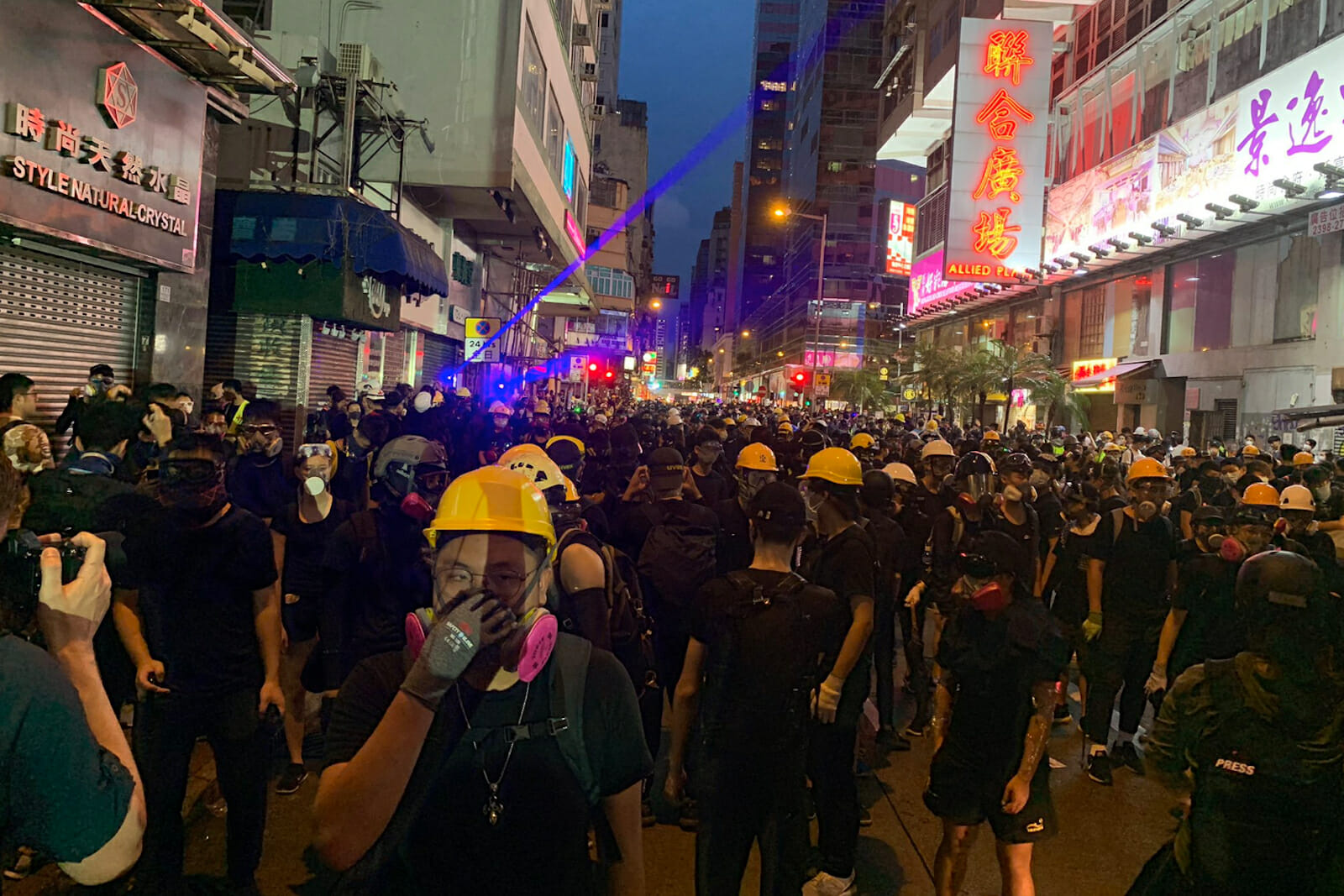
The Phantom of the Opera and Hong Kong’s ‘Point of No Return’
This summer, I spent many hours researching and writing on East Asian security matters. This usually entails sipping on a refreshingly strong iced cold-brew coffee, plugging my AirPods into my ears, listening to music on Spotify, and keeping my Twitter feed open. Recently, while working on my research, I listened to one of my favorite albums dating back to early middle-school: the original 2004 motion picture soundtrack of Andrew Lloyd Webber’s famed musical, The Phantom of the Opera. In one of the more climatic and fiery scenes of the musical, the Phantom passionately sings the following words to his true love, Christine Daaé, from one of the operas that he composed, titled “Don Juan Triumphant”: “Past the point of no return, no backward glances, our games of make-believe are at an end.”
Coincidentally, while listening to this song a few weeks back, I happened to be reading an article from one of my favorite news outlets, South China Morning Post, on the mobilization of protests in Hong Kong. To recap, for the past several months, hundreds of thousands, if not millions, of Hong Kong residents have actively engaged in mass demonstrations engendered by a proposal to amend a contentious extradition bill, which would enable the Chinese government to detain Hong Kong residents and foreign fugitives who have allegedly committed a crime. As a Special Administrative Region of China under the “one country, two systems” framework, the Hong Kong judicial courts have historically maintained autonomy, but with this bill, they would ultimately have to answer to Beijing, which to many residing in Hong Kong means sacrificing their democratic institutions and freedom from Beijing’s watchful eyes. In light of these protests, Hong Kong Chief Executive Carrie Lam declared this bill as “dead” on July 9th, which did close to nothing to appease the anti-extradition protestors. Nearly two months later, Lam announced that she would formally withdraw this bill, thereby meeting one of the five demands made by the protestors.
Needless to say, as of late, my brain has been like a hamster spinning in its wheel while attempting to keep up with the ensuing political turmoil in Hong Kong, but listening to “The Point of No Return” while reading about Hong Kong triggered something in me, because I asked myself if the chaotic streets of Hong Kong have already fallen fate to the lyrics of this powerful song. Before the end of this two-part song in the Phantom of the Opera, despite his unrequited love for Christine, the Phantom fervently pleads with her to choose him over her betrothed, Raoul, by reprising a song, titled “All I Ask of You.” Instead of fulfilling his wishes, Christine removes his mask in front of the entire audience in the Paris Opera House, thereby exposing his deformed, grotesque face.
Another slogan is “five demands, not one less” – basically saying even if the extradition bill in Hong Kong is officially withdrawn protests won’t stop until protesters get everything asked for pic.twitter.com/G8zPddnFJd
— Erin Hale (@erinhale) September 8, 2019
Similarly, that is what the Hong Kong protestors have done to the Hong Kong government: their demonstrations have unmasked their police force’s true colors with the prevalence of two symbolic mantras: “be water” and “an eye for an eye.” First, to evade the Hong Kong police, protestors have embraced one of Bruce Lee’s famous quotes: “be water.” As freelance reporter Erin Hale denotes in one of her pieces from The Independent, the “be water” strategy is more “guerilla-style” in nature, because the protestors move from location to location, thereby decreasing their chances of confronting teargas and getting arrested.
Second, many protestors have issued a clarion call to seek an “eye for an eye” after a young woman was allegedly hit in the eye while protesting at Tsim Sha Tsui on August 11th. Since then, protestors have worn eye-patches to showcase their support for her, and through a video recording supposedly made on August 26th, the young woman strongly urged the Hong Kong Police Force to end their violent tendencies. More importantly, she expressed her sincerest gratitude to all of the protestors who have since sparked a movement in response to her injury—she even deemed them the “unsung heroes of Hong Kong.”
The ongoing gatherings have also garnered a massive amount of international attention. On August 13th, the UN High Commissioner for Human Rights (OHCHR), Michelle Bachelet, expressed her grave concern over the Hong Kong police’s use of non-lethal weapons, and she strongly urged the Hong Kong government to start a civilized, public dialogue with the demonstrators, rather than resort to targeting civilians. Additionally, Twitter and Facebook broke news when they announced the suspension of nearly a thousand accounts that have been found to subvert the narrative of the Hong Kong protests through a calculated, state-sponsored campaign from the mainland. What is even more ironic about this headline is that Beijing severely stained its own credibility by surreptitiously infiltrating social media platforms that are banned from usage on the mainland. With no sign of protests receding anytime soon, the U.S. State Department issued a travel advisory on August 14th due to “civil unrest” in Hong Kong. Despite Lam’s concession, many protesters remain resentful of Lam, and Hong Kong entered its 14th weekend of protests on September 7th.
Recently, I traveled to Washington D.C. and Philadelphia and met up with a few erudite East Asia security/human rights experts. To no surprise, the Hong Kong demonstrations dominated our conversations, and I could not help but periodically visualize “The Point of No Return” scene from The Phantom of the Opera during our discussions. Once again, I asked myself the same question: Is Hong Kong at the point of no return? Even with Lam formally withdrawing the extradition bill, protestors remain resolute in their stand to safeguard their freedom and making sure that all five of their demands have been met; therefore, standoffs between them and the Hong Kong police have not receded. Additionally, many residents have migrated to democratic safe havens, most notably, Taiwan.
As unfortunate as it is, it seems that the Phantom’s lyrics from “The Point of No Return” has materialized in Hong Kong, and there is no sign that this political unrest will come to an end anytime soon.
